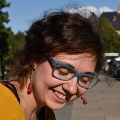


Nore De Grez graduated in 2016 as Master of Educational Sciences at Ghent University. In October 2016, she started as teaching assistent and PhD researcher under the supervision of Prof. Dr. Bram De Wever at the department of Educational Studies at Ghent University. Her PhD project focuses on collaborative writing within a computer supported learning environment. More specifically, she studies the use of CSCL tools to support higher education students during collaborative writing tasks.
Abstract.
Increased use of computer-supported collaborative learning environments (e.g. Google docs) to support collaborative writing tasks in higher education.
This study aims to fill the gap in current research by studying the complex process of collaborative writing by taking into account individual, collaborative, and contextual variables and the interaction between them in order to provide appropriate support.
Master students (N=50) collaborated in triads during a 90-minutes collaborative synthesis task in Etherpad, an online text editor.
Individual preferences and experiences concerning collaborative writing were examined in relation to the way groups tackled the synchronous collaborative writing task.
Structured abstract.
Background
Collaborative writing (CW) tasks are ubiquitous within higher education. However, CW is also described as a highly complex process since it is often unstructured and includes multiple roles, sub tasks, and activities which all can be performed interactively (Lowry, Curtis, & Lowry, 2004). Previous research showed that the way groups tackle this complex task differ and that this seems related to the quality of final products (e.g. Engel & Onrubia, 2010) and performances (e.g., Mayordomo & Onrubia, 2015). Further, a relationship can be presumed between the temporal distribution of (meta-)cognitive activities and text quality based on individual writing studies (e.g. van den Bergh & Rijlaarsdam, 2001).
Recently, there is an increased interest in the possibilities of Web 2.0. CW technologies, such as Google Docs, which can allow a more synchronous form of CW. However, research on how groups tackle this kind of CW tasks and how this relates to outcomes is limited.
Aims
This exploratory study aims (1) to enhance the understanding of the CW process; (2) to explore the relation of these process features with the quality of the group product; (3) and to shed light to the relation with students’ own experiences and evaluation of this task.
Sample
50 Master students
Method
All students worked together during 90 minutes within Etherpad, an online text editor, to create a synthesis based on three provided sources. As a preparation to this task, each group member was provided with another source. Afterwards, they completed an online reflection task and a stimulated recall interview was conducted with each student.
Downloads.

Abstract.
This study illustrates the effects of two different scripting approaches (Vogel, Wecker, Kollar & Fischer, 2016) to scaffold students’ scientific reasoning abilities while being engaged in collaborative writing activities on their learning processes and outcomes within Web 2.0 environments in higher education. Three similar studies were set up for university students (N=88) in Germany (n=27), Belgium (n=43), and Finland (n=18). Although the content of the course differed, the scripted task was the same in all settings, namely writing a recommendation paper on a specific subject. Students collaborated in small groups of three to four via Web 2.0 technology, i.e. in a shared Google Document. In each course, groups were divided randomly over two scripted conditions: (a) phase-script: a script that segmented collaboration in different phases (based on a script used by De Wever et al. 2015) and (b) phase-plus-activities script: an extended script that also provided learners with guidance on the specific activities to engage during each phase. As dependent variables we measured students’ scientific reasoning (SR) ability with a performance and declarative test, their subjective knowledge acquisition (both with respect to content and SR ability) and their acceptance of the scripts. This presentation however focuses only on the latter. By qualitatively analyzing students’ reflection notes, we investigate how students perceived the scripts and whether and how students made use of the script. This is important in view of later analyses focusing on the differential impact of the script on students’ learning outcomes.
Copyright © 2018 - All Rights Reserved - TECOLAB - Department of Educational Studies - Ghent University
Website by TECOLAB - Template by OS Templates